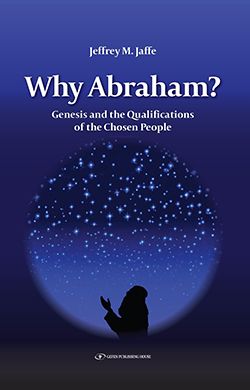Why Abraham? Genesis and the Qualifications of the Chosen People by Jeffrey M. Jaffe, Gefen Publishing House, Jerusalem, ©2024, ISBN 9789657-801444, 154 pages, plus appendices, $19.95.
By Fred Reiss, Ed.D.

 WINCHESTER, California – There is a debate as to the origin of this story, but as I heard it, a priest, approaching Benjamin Disraeli, Prime Minister of the United Kingdom at the time, challenged him with the statement, “How odd of God to choose the Jews.” To which Disraeli replied, with a smirk, ‘Twas not odd, the Jews chose God.”
WINCHESTER, California – There is a debate as to the origin of this story, but as I heard it, a priest, approaching Benjamin Disraeli, Prime Minister of the United Kingdom at the time, challenged him with the statement, “How odd of God to choose the Jews.” To which Disraeli replied, with a smirk, ‘Twas not odd, the Jews chose God.”
Author Jeffrey Jaffe in Why Abraham? explores the Jewish people’s “chosen-ness” with questions such as, why would God designate any nation to be special, and specifically what possessed God to select Abraham as patriarch? Jews in the Hebrew Bible are, indeed, special but Abraham is nothing more than a name on a family tree until God abruptly orders him to flee across the Jordan River. Genesis Chapters 12 through 25, in Jaffe’s view, relate through various vignettes, the history behind God’s choosing Abraham and later Sarah for their unique status, as well as offering up stories telling why some of their descendants became part of the Chosen People and others not.
Midrashim generally declare Abraham to be an exemplary man of faith. The earliest kabbalistic text Sepher Yetzirah, describes the creation of the world through emanations, sephirot (likely numbers), and Hebrew letters as agents of God. In its last chapter the author, declaring Abraham to be the father of the Jewish nation because he independently apprehended how God created the world through this method writes, “Then the Lord of All, Blessed be His Name… made a seat for him (Abraham) in His bosom and He kissed him on the head and called him ‘My beloved.’”
Jaffe takes a different approach, one the rabbis call peshat, interpretation through surface or direct meaning of text. Some consider rendering text at face value straightforward and easy, but it’s not. The Torah is parsimonious with its wording; sometimes painfully so, and often widely separating related concepts and stories, like looking for two matching buttons located in different places in a haystack full of random buttons.
Drawing on writings from numerous biblical commentators and pulling stories from disparate locations within Genesis, Jaffe identifies Abraham’s God-worthy essence, three attributes allowing him to become the first patriarch: Unquestioning belief in an ethical God by wholehearted recognition of God’s commitment to His word, authentic desire to transmit God’s heritage, and unwavering obedience to God’s commands. He further describes how these qualities allow Abraham, and yes Sarah, to successfully navigate and pass God’s ten tests.
Through inquiry, analysis and exposition, Why Abraham? justifies these assertions.
Abraham is human and thus imperfect, compelling Jaffe to devote an entire chapter and appendix listing thirty anecdotes in Abraham’s life, finding at least eight appearing to underscore personal failings, such as Abraham and Sarah in Egypt with Pharoah and Abraham and Sarah with Abimelech. Carefully dissecting each of these, Jaffe concludes, “God placed Abraham in difficult situations with no easy solution. Abraham satisfied the tests by remaining committed to obedience, belief and transmission.”
Why Abraham? presents thoroughly researched and solid explanations of how Genesis’ stories and tales about him embody these character traits, including Abraham living among the Canaanites to spread the word of God, his later graciousness toward Lot, and demanding justice for the innocent living in Sodom and Gomorrah.
Beyond the life of Abraham, continuation of the Chosen People is paramount, a topic Jaffe examines in three chapters through interpretations of God’s tests in the lives of Isaac, Esau, Rebecca, and Jacob. Chiefly, Isaac at the altar with his father; Esau’s relationship with his brother, particularly the blessing double-cross; Rebecca as wife and committed partner; and Jacob’s encounter with an angel and apparent loss of his beloved son Joseph.
Jaffe gives his readers a scholarly, but easily accessible accounting of the epoch and nascent moments in Judaism, letting the biblical text speak for itself. His insights and elucidations provide much material as a launching pad for thought-starters and further discussions, as well as grist for many rabbinic sermons.
#
Fred Reiss, Ed.D., is the author of The Jewish People’s Planner, A 16-Month Planner and Almanac for 5785/2024-2025 and The Comprehensive Jewish and Civil Calendars, 2001 to 2240.